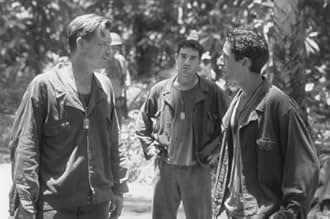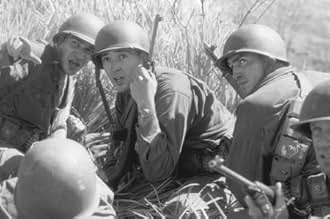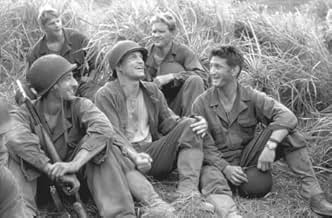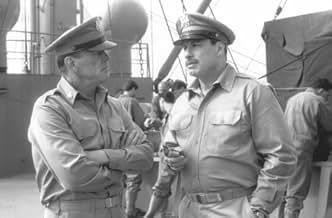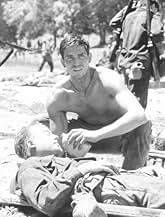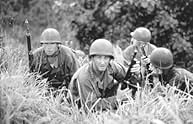Verfilmung des autobiografischen Romans von James Jones aus dem Jahr 1962, in dessen Zentrum die Schlacht um Guadacanal im Zweiten Weltkrieg steht.Verfilmung des autobiografischen Romans von James Jones aus dem Jahr 1962, in dessen Zentrum die Schlacht um Guadacanal im Zweiten Weltkrieg steht.Verfilmung des autobiografischen Romans von James Jones aus dem Jahr 1962, in dessen Zentrum die Schlacht um Guadacanal im Zweiten Weltkrieg steht.
- Für 7 Oscars nominiert
- 23 Gewinne & 47 Nominierungen insgesamt
- Witt's Mother
- (as Penny Allen)
- Melanesian Villager
- (as Benjamin)
Empfohlene Bewertungen
This story about the Guadalcanal campaign during WW2, based on the James Jones novel, weaves the lives of many characters together seemlessly, creating a philosophical/emotional experience of war. It's not just about war. It's about love, faith in yourself and others, friendship, humanity, morality and also works as a startling indictment of man's conflict with nature. The amazing opening sequence, sets up a tranquility as the character Witt, finds peace on a secluded island among the natives, a peace which is shattered by the war.
What follows is not a mindless battle-after-battle onslaught of pyrotechnics, smoke, dust and blood, but a thought-provoking, visually and verbally poetic analysis of war and humanity. In my opinion it is the greatest war film since Apocalypse now, which I believe bears more flaws than this. It's not an Us-and-Them war story about the glory of the USA defeating the evil Japs. It sticks close with the characters, as we hear the thoughts, their hopes, their fears, leading to a moving experience.
This film was released a few months after Saving Private Ryan and unfortunately did not experience the same attention that the latter film did. Ryan was an excellent film, but to offer a comparison, The Thin Red LIne treads where Ryan didn't dare. Ryan sat in the safe territory of Good vs Evil with a bit of Futility of War and a lot of American Patriotism. It seemed to be more about America at some points than about war. The Thin Red Line is about war, the people involved and the destruction it creates for the mind, the soul and for nature. It does not deviate from this to make simple contrasts and offer easy binary oppositions.
In fact, TTRL is not an easy film. Gasp, it even tries to make you think. Though the title is not really explained in the film, I believe it is implied, and could have many meanings - the line between sanity and insanity, morality and immorality, love and hate, companionship and loneliness, nature and man, war and peace. While the characters share their thoughts, deeply poetic as they are, the meaning is not thrown in your face and neither is the answer to the questions raised. In this way it is the most thought-provoking war film I've ever seen and one of the best films of all time in my book. Top ten easily.
Now to my whinge. I think TTRL was shunned unmercifully at the 1999 Oscars. Shakespeare in Love beat two brilliant films - TTRL and Elizabeth - to get that oscar, and don't get me started on Gwyneth's award. This is the best film of 1998/9, in line with Elizabeth. It's unfortunate that the two, thoug h greatly revered, did not achieve the success and attention they deserved.
Don't be afraid by its length, it's a beautiful journey, full of rich colour, sound and the reward is a deeply moving human experience, unlike any other that the past decade has offered.
Director Terrence Malick's films are alive with a sense of pure cinema with every frame delivering such detail and richness that you could swear you were there. The only other person capable of bringing such an immediate sense of time and place and sheer nuance of film (although in a completely different way) is David Lean, another major league craftsman.
Here, again, Malick uses his customary voice-over device although this time as a means of vocalising the abstract thoughts of the various soldiers as they struggle to make some sense of the conflict. It's an interesting approach which allows the audience to identify with the characters in a far less superficial way than in, say, SAVING PRIVATE RYAN (the film THE THIN RED LINE is most often and most unfairly compared to). Malick is also not afraid to take time to illustrate the continuing natural backdrop to the carnage. Mother Nature almost seems to be occupying a pivotal supporting role as a detached observer on the sidelines, calmly and inscrutably watching the chaos develop.
It's a measure of Malick's complete disinterest with the normal conventions of Hollywood that actors such as Lucas Haas, Vigo Mortensen, Jason Patric, Mickey Rourke, Martin Sheen and Billy Bob Thornton all spent months in Queensland Australia and the Solomon Islands filming roles that ultimately ended up on the cutting room floor. Blink and you'll also miss major marquee players such as John Travolta and George Clooney. The stand-out performances come from Jim Caviezel and, especially, Nick Nolte.
Nolte just seems to be getting better and better as he gets older and his portrayal of tyrant Colonel Tall is something to see. I have never seen anyone express such an impotent sense of rage, anger and fury than Nolte does here. It's a fantastic performance from a real pro and it's a mystery to me why he didn't get an Oscar.
John Toll's pristine cinematography and Hans Zimmer's wonderfully evocative (Oscar-winning) score are other strong elements. The unusual music and visuals contrast so well that Malick sometimes fades out the noise of the shouting, explosions and guns, an effect that only serves to heighten the emotional power of the experience further.
You won't see a more beautiful film about the horrors of war. Movies like this make the task of trawling through the weekly diet of dumb formulaic junk served up by Hollywood almost seem worthwhile.
Saving Private Ryan was significant in that it visually depicted war in a realistic, gritty way. The Thin Red Line's focus is more philosophical. It is about the contradiction between the beauty of nature and the destructive nature of men. The movie cuts continuously between the external struggle of American GIs fighting to take a crucial hill from Japanese occupation on Guadalcanal - and more importantly, the internal chaos of war as every man tries to come to his own terms about matters such as morals, death, God, and love.
Unlike in Saving Private Ryan, there is nothing patriotic about this movie. In fact, there probably has never been a more anti-war film. The fighting men here are disillusioned, lost, and frightened. They don't fight for their country or "democracy" - they fight because they have to. The only priorities are survival, and - for the more humane - caring for their comrades. Renowned composer Hans Zimmer - who won an Oscar nomination for his work-captures the grim mood perfectly and allows us to hear the men's thoughts.
The characters are portrayed by a strong ensemble cast. Acting is uniformly excellent, especially Nick Nolte as Colonel Tall, who is the unfeeling commander of the ground offensive on Guadalcanal. Thoroughly unlikable, he is the closest thing to a villain in the movie. After studying war for an untold number of years, Tall sees Guadalcanal as his chance to prove himself and move up in the ranks - the men are only a tool to accomplish this goal and expendable. In one crucial scene, he orders a captain (played by Elias Koteas, in another outstanding role) to lead his men to a frontal assault against a Japanese controlled hill. When the captain suggests a more logical alternative, the colonel screams: "You are not gonna take your men around in the jungle to avoid a goddamn fight!" To this, the captain replies, `I've lived with these men, sir, for two and a half years and I will not order them all to their deaths.' Later, when the hill is taken, he is dismissed of his duties as Tall sees him as a threat to the successful achievement of his goal. Certainly, not every commander must have been that coldhearted and selfish, but surely some were, though not necessarily to that extreme.
While the acting is very good, much of the cast is relatively unknown and it can initially be hard to distinguish the characters from each other as they may appear to be very similar. They are all about the same age, have dirt smeared over their faces, and wear helmets and the same military garb. Also, the stars in this movie have very small roles. George Clooney and John Travolta are credited with starring roles while really little more than extras - clearly for marketing purposes. You will not see more than two minutes of each.
One of the main themes of the movie is the contrast between nature and men's destructiveness in war. The director, Terrence Malick, hired cinematographer John Toll to capture this on camera, and towards achieving that goal they couldn't have been more successful. The almost surreal scenery is nothing short of stunning and has the same visual impact as any special effect. The beauty of nature is always present, even when it is a setting for battle of destruction, and death.
Though the battle scenes fall short of the frightening realism in Saving Private Ryan, they are heads and soldiers above every previous attempt. One truly gets the sense that war is a chaotic, often hopeless environment where it is only a matter of luck whether you survive or get killed.
`How did we lose the good that was given us? Or let it slip away? Scatter it carelessly ... trade it for what has no worth?' The film is filled with such poetic questions as to which there are no real answers. This is definitely not a party movie. There isn't anything uplifting about it - it is downright depressing. Asides from entertainment value, however, this is a film that makes you think.
The Thin Red Line asks a lot of good questions about death, war, and the ultimate meaning of life. Now that I have seen it, I'm very surprised that this film did not win picture of the year. Spielberg's film was a gritty, realistic portrayal of war. But it was also highly commercial and had a very contrived plot. In comparison, this film sort of wanders through itself and in the process helps to put you in the boots of the soldiers it portrays.
My only criticism is perhaps the film was a bit long, but I never noticed that the second time through. I can't praise this film enough. Excellent work.
Wusstest du schon
- WissenswertesMost of Adrien Brody's scenes were cut from the film and he wasn't aware of these changes until he saw the film at the premiere. Brody came to the premiere expecting to see himself as the lead character and was shocked when he saw that he was barely featured in the film, especially since Cpl. Fife was the central character in the novel on which the movie was based.
- PatzerIn one of the flashback scenes where the soldier and his girlfriend are holding hands, modern cars can be seen out the window in the background.
- Zitate
Private Edward P. Train: [narration] This great evil, where's it come from? How'd it steal into the world? What seed, what root did it grow from? Who's doing this? Who's killing us, robbing us of life and light, mocking us with the sight of what we might've known? Does our ruin benefit the earth, does it help the grass to grow, the sun to shine? Is this darkness in you, too? Have you passed through this night?
- Crazy CreditsComposer Wrangler. . . Moanike'ala Nakamoto
- VerbindungenFeatured in HBO First Look: The Thin Red Line (1998)
- SoundtracksThe Unanswered Question
Composed by Charles Ives
Performed by Orchestra of St. Luke's (as The Orchestra of St. Luke's)
Conducted by John Adams
Top-Auswahl
- How long is The Thin Red Line?Powered by Alexa
Details
- Erscheinungsdatum
- Herkunftsland
- Sprachen
- Auch bekannt als
- La delgada línea roja
- Drehorte
- Produktionsfirmen
- Weitere beteiligte Unternehmen bei IMDbPro anzeigen
Box Office
- Budget
- 52.000.000 $ (geschätzt)
- Bruttoertrag in den USA und Kanada
- 36.400.491 $
- Eröffnungswochenende in den USA und in Kanada
- 282.534 $
- 27. Dez. 1998
- Weltweiter Bruttoertrag
- 98.126.565 $
- Laufzeit2 Stunden 50 Minuten
- Farbe
- Sound-Mix
- Seitenverhältnis
- 2.35 : 1
Zu dieser Seite beitragen






